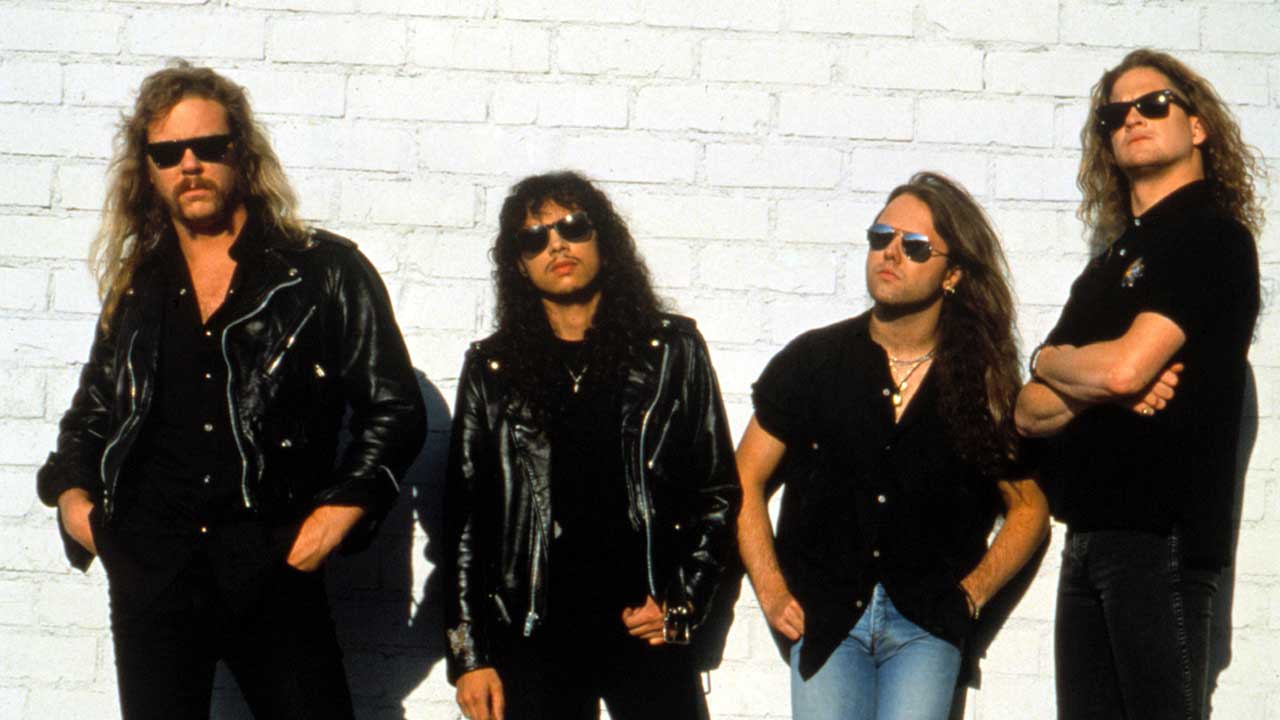"When you can simplify what it is you want to say it's easier for more people to connect to": How Metallica stripped away the complexity to take their music to the masses
With a little help from astrophysics, Ice-T and Heart, Metallica came up with Enter Sandman, their best-known song and a heavy metal classic

It’s Metallica’s most famous song, and one of metal’s greatest anthems. And as the band’s drummer and co-founding member Lars Ulrich recalls, what he experienced in the creation of Enter Sandman was something akin to divine inspiration. “The planets were aligning,” he says. “It’s like you’re guided by some sort of cosmic energy, it steers you.”
In 1991, Enter Sandman was, in every respect, a game changer for Metallica. For the band that had defined thrash metal in the 80s, this track had a different kind of heaviness, a measured power and epic feel comparable to AC/DC’s Hells Bells. And with this artistic breakthrough came commercial success on a massive scale.
Enter Sandman was the hit single that set the band’s fifth album – officially titled Metallica but commonly known as the Black Album – on the path to selling more than 30 million copies worldwide. It was this track, more than any other, that elevated Metallica from cult heroes to the world’s biggest metal band.
“I’m the worst one at being analytical and intellectualising Metallica songs,” Ulrich says. “But if I have to put that hat on, I guess it was just the right song at the right time.”
As Ulrich sees it, necessity was the mother of invention. Metallica’s last album of the 80s, …And Justice For All, was their most complex, and in places, overwrought. “I look at it very practically,” Ulrich says. “With the first four Metallica albums, it was a journey that sort of got more and more progressive, more and more crazy and kooky and long-winded. It got sort of nuttier and nuttier along the way. So when we were done with the Justice cycle we were like: okay, there’s got to be a reset here, because we can’t just keep going longer and crazier and more progressive.
"It’s sort of like we hit a wall. So when we got together to write the next batch of songs, the mission statement was: simplify. And the first song we wrote, on day one, was Enter Sandman.”
The song was written by Ulrich, guitarist/vocalist James Hetfield and lead guitarist Kirk Hammett. The main riff was composed by Hammett alone in the small hours of an overnight session, its dark tone and heavy mood inspired in part by Soundgarden’s 1988 album Louder Than Love. In stark contrast to the convoluted material on …And Justice For All, Enter Sandman was, as Ulrich described it, “a one-riff song”.
Sign up below to get the latest from Classic Rock, plus exclusive special offers, direct to your inbox!
“It’s so hard to just write short and sweet,” he says. “But we nailed that one on the head because at that time it was completely instinctive. There was just something about that moment, and you can never recreate that sense of having the slate completely clean or that sense of one hundred per cent instinct or just being completely devoid of thought or any sort of contrived idea of what you’re creating.”
For his solo, Hammett turned again to Seattle rock, albeit via a secondary source – a sample of the lead break from Heart’s 1975 classic Magic Man on rapper Ice-T’s album Power. “I heard that,” Hammett said, “and thought: ‘I have to snake this!’”
But while so much of Enter Sandman came easily, the lyrics were more problematic. The first song written for the Black Album was the last to be finished. Hetfield’s first-draft lyrics addressed the subject of cot death. As he later outlined it bluntly: “Baby suddenly dies, the sandman killed it.”
When Ulrich and producer Bob Rock suggested a rewrite, Hetfield was incensed. But in time he cooled off, and came back with new lyrics in which his visions of childhood nightmares matched the sinister feel in the music. Notably, in place of a rather clunky line ‘Disrupt the perfect family’, he delivered the signature hook: ‘Off to never never land.’
As Ulrich says of the power in Enter Sandman: “It was a whole slew of things that came together. That riff is obviously super-memorable. When those toms come in the whole building starts shaking. And then there’s that sense of wonder in the lyrics.”
Many diehard Metallica fans, the thrash metal freaks, had cried “sell-out” when Bob Rock had been enlisted as producer for the Black Album, a guy known for his work with hair-metal poseurs such as Bon Jovi and Mötley Crüe. But it was Ulrich who had pushed for Rock, impressed by the huge and heavy sound of the Crüe’s Dr. Feelgood. As he says now, his faith in Rock was more than vindicated by the building-shaking sonic boom of Enter Sandman.
“The simpler the song is, the simpler it is to make it sound good,” he says. “Highway To Hell is probably the simplest AC/DC song, and it’s also the one that sounds the best. Because the simpler it is, the less that’s there, the more the sonics can speak. When you can simplify what it is you want to say – whether it’s Jumpin’ Jack Flash or Rock And Roll or Smoke On The Water – it’s easier for more people to connect to.”
It was also Ulrich who pushed for Enter Sandman to be the album’s opening track and flagship single, when others in the Metallica camp were favouring Holier Than Thou, a high-speed blast of thrash metal firmly rooted in the band’s past. Ulrich won that argument, and again he was vindicated. In 1991, a year of revolution in rock music, spearheaded by a trio of multi-platinum albums by Seattle grunge bands – Nirvana’s Nevermind, Pearl Jam’s Ten and Soundgarden’s Badmotorfinger – with Enter Sandman Metallica had a new sound for a new era.
Ulrich concludes: “If Enter Sandman had come out five years earlier or five years later it may have been a different thing. The one thing I always make sure to say is you can never take the moment out of it. Enter Sandman was a moment, and that moment happened to resonate with a lot of people."
Freelance writer for Classic Rock since 2005, Paul Elliott has worked for leading music titles since 1985, including Sounds, Kerrang!, MOJO and Q. He is the author of several books including the first biography of Guns N’ Roses and the autobiography of bodyguard-to-the-stars Danny Francis. He has written liner notes for classic album reissues by artists such as Def Leppard, Thin Lizzy and Kiss, and currently works as content editor for Total Guitar. He lives in Bath - of which David Coverdale recently said: “How very Roman of you!”

